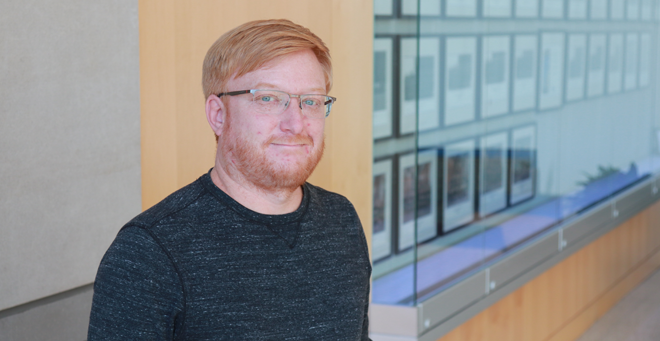 |
|
|
Daniel Mullin, PsyD |
The Substance Abuse and Mental Health Services Administration (SAMHSA) has awarded a three-year, $450,000 grant to UMass Medical School to create a training program that will qualify medical, nurse practitioner and physician assistant students to provide medication-assisted treatment for opioid-addicted patients. Medication-assisted treatment, which combines behavioral therapy with drugs, including buprenorphine, is recognized as the best evidence-based therapy for opioid addiction. The multidisciplinary, interprofessional project team will build and deliver the curriculum to all four medical schools, as well as nurse practitioner and physician assistant programs, in Massachusetts.
“Intervening at an early stage of training has the potential to drastically increase the number of trained providers,” said principal investigator Daniel Mullin, PsyD, associate professor of family medicine & community health and director of the Center for Integrated Primary Care at UMMS. “Establishing addiction treatment as an essential competency in health professional education ensures that students in all medical degree programs, as well as many nurse practitioner and physician assistant programs, in Massachusetts will, upon graduation, have already completed the required waiver training and become familiar with addiction treatment.”
The Drug Abuse Treatment Act of 2000 significantly increased access to treatment with buprenorphine, the only medication for opioid use disorder that can be prescribed or dispensed in medical offices, community hospitals, health departments and correctional facilities. But in order to prescribe or dispense buprenorphine, providers must qualify for a Drug Abuse Treatment Act waiver. This includes completing specified training and meeting application requirements, which can be barriers to adoption by providers already in practice.
“We’re very proud that 100 percent of UMMS family medicine residents have at least two years of experience treating patients with opioid use disorder, versus an estimated 10 percent nationally,” said Dr. Mullin. “We want to replicate this in undergraduate medical, graduate nursing and physician assistant education.”
The training program will be developed in collaboration with Tufts, Harvard and Boston University Schools of Medicine. Once each school has integrated Drug Abuse Treatment Act waiver training into the four-year undergraduate medical curriculum, every medical student in Massachusetts will graduate having completed training requirements. A number of nurse practitioner and physician assistant programs, including the Graduate School of Nursing at UMMS, will also implement the curriculum to help students achieve the 24 hours of Drug Abuse Treatment Act waiver training required for those professions.
Students from all three disciplines advocated for the winning grant proposal, one of 24 awarded nationwide. “I don’t think this project would have happened without the students’ leadership,” Mullin said.
“We need to know how to treat opioid addiction, just as we’re trained to treat other chronic health disorders like diabetes and hypertension,” said Marya Pulaski, SOM ’21, who co-leads the Substance Use Disorder Optional Enrichment Elective at UMMS and is a member of the Massachusetts advocacy group Student Coalition on Addiction. “Every prescriber can save lives.”
Expanding Drug Abuse Treatment Act waiver training opportunities for nurse practitioners and physician assistants further extends that potential.
“Addiction is a chronic relapsing brain disease and we need to have the tools to be able to take care of our patients,” said Brittany Carney, MS, RN, a GSN Doctor of Nursing Practice student. Carney, who also co-leads a Substance Use Disorder Special Interest Group at UMMS, brings her past experiences working in addiction medicine to represent the nursing student perspective on the grant. “This grant will enable a new generation of providers to do that.”
The curriculum will offer online modules that can be flexibly deployed across the four years of medical school and into nurse practitioner and physician assistant curricula.
“This is appealing because all health professions curricula are quite different,” said grant advisor Melissa Fischer, MD, MEd, professor of medicine and associate dean for undergraduate medical education, academic innovation and the interprofessional Center for Experiential Learning and Simulation. “Schools can decide to use all of the modules or pick and choose.”
A test curriculum will be developed in grant year one and Dr. Fischer will pilot it at the School of Medicine in the grant’s second year, ahead of making the final version available statewide in the third year. Jill Terrien, PhD, ANP-BC, associate professor of nursing, is the grant team’s lead for the nurse practitioner component of the grant.
Related stories on UMassMedNow:
UMass Medical School recognized with national award for opioid safe-prescribing curriculum
Nearly 800 trained through UMMS opioid safe prescribing curriculum, according to AAMC editorial
Safe-opioid prescribing working group details success in AAMC journal Academic Medicine
AP Big Story: UMass Medical School trains students to fight opioid abuse
UMMS implements curriculum changes in current academic year to address opioid crisis
UMMS working with other Mass. medical schools, governor on opioid prescribing practices
UMMS Graduate School of Nursing adopts opioid conscious curriculum